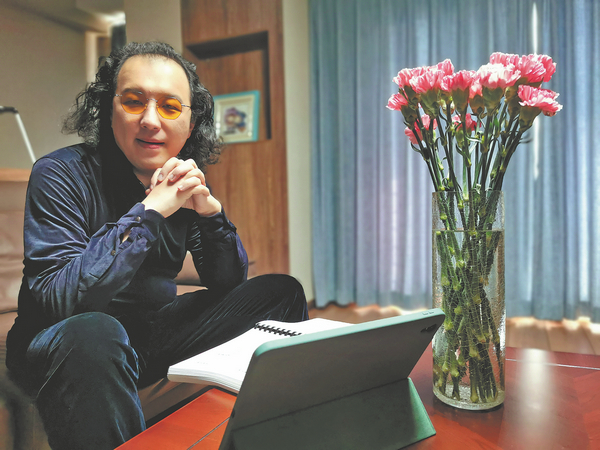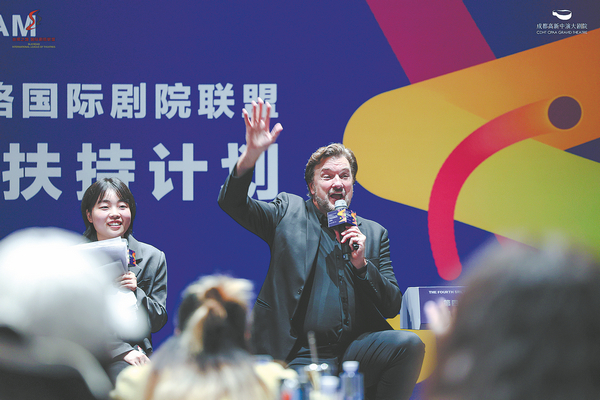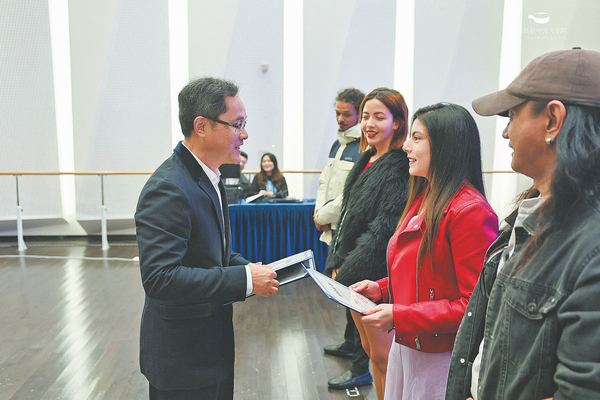

Qian Qi, another mentor of the training program and a professor at the Music AI and Information Technology Department of the Central Conservatory of Music in Beijing, shared the innovative concepts and practices of electronic music for the contemporary stage.
He emphasizes that music creation must be people-centered, close to real life and reflect the joys, sorrows, and struggles of ordinary people. Otherwise, it will fail to resonate with the audience.
"The wide use of social media has raised the bar for creators," says Qian. "If your work is good, there is no need to worry about the market. But if it's not, no amount of promotion can save it."
Since China proposed the Belt and Road Initiative in 2013, Chinese stage art has increasingly engaged in overseas exchanges, which has also raised higher requirements for its quality, he says.
"Works staged overseas must first stand up to the scrutiny of domestic audiences, which requires them to be deeply rooted in our national culture," Qian says. "Meanwhile, universally understood art languages must be used to make the works more easily acceptable and culturally recognized."
He cited as an example the original Chinese acrobatic drama A Thousand Years in One Finger, for which he is composing the music. Scheduled to premiere by the end of this year, it tells of a relic restorer who, through a fingerprint on a Terracotta Warrior statue, travels back to the Qin Dynasty (221-206 BC).

By integrating various elements, including Shaanxi province's iconic Qinqiang Opera and Qinyue, the traditional music of the Qin Dynasty, as well as symphonic, electronic and world music, an entirely new auditory experience that blends tradition with modernity is created.
SRILT was launched in October 2016 by the CPAA Theatres under the China Arts and Entertainment Group, a State-owned cultural enterprise that has performance and exhibition business worldwide.
The league serves as a performing arts platform to promote cultural exchanges between China and other countries. By the end of last year, it had 162 members from 45 countries and regions.
Li Jinsheng, chairman of the China Arts and Entertainment Group, says the SRILT training program, supported by the Ministry of Culture and Tourism, invited multiple leading figures in the performing arts industry from home and abroad to serve as mentors this year.
They provided industry insights and practical experience to more than 100 young performers, who attended the event in person or online.
"The four editions of the training program, covering fields of performance, music, stage technology and theater management, have not only enhanced the trainees' professional abilities, but also promoted people-to-people connectivity," he says.
Li says the training program aims to enlarge the SRILT's talent pool, which currently has nearly 400 people, mainly from the countries and regions with SRILT members.
Over the past eight years, the SRILT has arranged several tour routes across Asia, North Africa, Western Europe, Central and Eastern Europe, and the US Midwest, enabling outstanding Chinese troupes to stage a series of overseas performances, he says.

In March this year, CPAA Theatres signed agreements with Boston University and Nederlander Worldwide Entertainment respectively, to enhance personnel exchanges, promote the cultivation of performing arts talent, share theater management experience, and jointly create stage art works.
Under the company's cooperation framework with the Nederlander Worldwide Entertainment, an SRILT member, programs such as a musical incubation season and a music talent training and incubation base will be gradually implemented in Chengdu, he adds.
Contact the writers at pengchao@chinadaily.com.cn